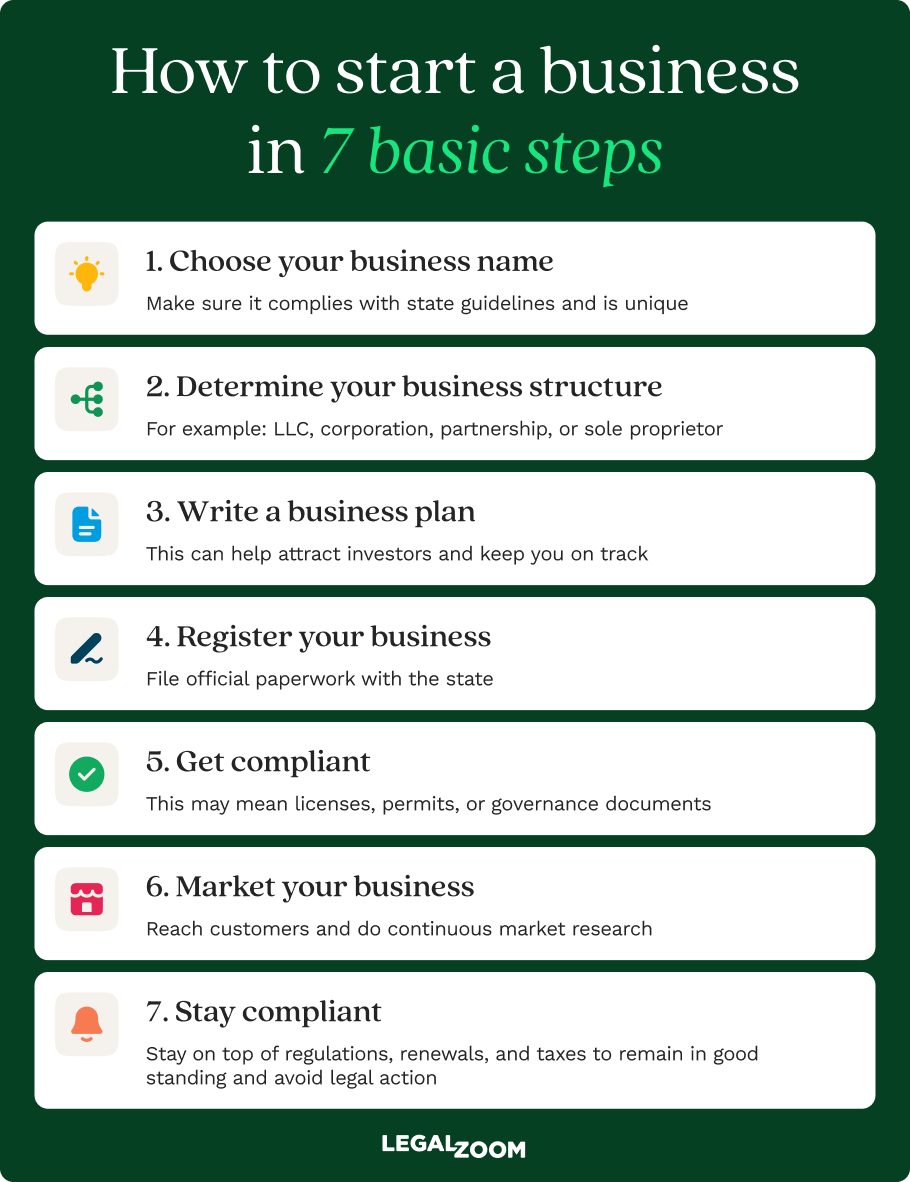It can be overwhelming to start a business with no money, as limited cash can make marketing, hiring employees, and securing necessary materials challenging. While money certainly matters, the truth is that you don't need a whole lot of startup capital to start a business.
If you truly have a passion for what you're building, you'll find a way to make it work. Be savvy about what tools you use, network actively, and seek funds from various places to make your dream a reality.

Can you start a business with no money?
Yes, it's absolutely possible to start a business with no money, or at least with so little that you'll hardly miss it. Many successful businesses, including the likes of Amazon, MailChimp, Survey Monkey, and Spanx, started on a shoestring budget with zero to limited outside funding. These founders often held on to their full-time jobs while they side hustled to build the businesses they envisioned.
Today, there are plenty of digital tools and free resources, like online courses and free business plan templates, that can help you start a business.
However, you must be prepared to work hard and demonstrate resourcefulness and resilience. Add a dash of ingenuity, and your business can be up and running in no time.
Here are some tips on how to start a business with no money.
Assess your skills and resources
You may already have a few ideas about starting your business. If you don't, a great place to start is to look internally and assess your skills and resources for traits that can be monetized. Perhaps you have an existing passion or skill that can be used to solve a problem for others. For instance, you may be quite the home organizer or extremely savvy with investments, so why not build on that? Becoming a professional home organizer or a financial adviser can be an exciting business opportunity.
As you brainstorm, do some research into businesses that can be started using things you likely already own, like a computer, phone, vehicle, or even your personal high-grade camera.
It's also helpful to consider the following popular business ideas that require minimal upfront investment.
Service-based business ideas
Many service-oriented business ideas can be started without significant capital. If writing is your calling, why not provide freelance writing or content-creation services? If you are good with kids and breaking down complex topics, becoming a freelance tutor or online course creator may be the way to go. The possibilities are endless. So, if you have a unique skill, you can turn it into a service business.
Other freelance business ideas worth considering include providing the following:
- Social media marketing services
- Financial consulting services
- Virtual assistant services
- Graphic or website design services
- Wedding or event planning services
Online business ideas
There are a plethora of low-cost business ideas that just need an Internet connection to leverage the power of technology, such as:
- Dropshipping is where you sell products without the headache of inventory.
- Print-on-demand stores that offer customized products like mugs, t-shirts, backpacks, or stationery.
- Digital product websites that sell ebooks, worksheets, templates, or photo sets.
Home-based business ideas
There are also multiple businesses you can start from the comfort of your home using resources you may already have on hand.
- Homemade products like cheeses, vinegars, jams, batters, breads, and other baked goods.
- Handmade and artisanal products such as jewelry, artwork, soaps, or candles.
- Personalized items like monograms or names on stationery, envelopes, greeting cards, towels, and quilts.
Vet your business idea
When you're starting a business on the cheap, chances are you envision eventually putting money into your idea, even if you're going to reinvest the proceeds.
"Before you put money in your business, make sure you validate your idea within your trusted circle," says Fahim Sheikh, owner of SaaS company Trellis. "Sometimes, we think we have a great idea, but when we explain it or pitch it to others, we often realize that the concept may be a tough sell."
Despite the startup costs being low, it's essential to make sure your idea has legs that will make it worthwhile to sink not only your time into but also your eventual earnings. Conducting market research—whether through gathering insights from customer surveys, studying what competitors are up to, or even selling a few product samples—can help you assess the viability of your idea.
Develop a business plan
Many small business owners will attest to the importance of having a solid business plan. A business plan grounds your business idea while providing a framework for startup costs and cash flow. There are several business plan templates available online, and you are free to use any, however, make sure you thoroughly address the following factors.
- Define your business model. Identify the product or service you will provide and the gap it fills in the market. Outline your target market demographics, such as age, income, gender, and preferences, as well as how the business will generate money.
- Set clear objectives. Write out both long and short-term goals for the business. This exercise gives you something tangible and measurable to work toward. Techniques like a SWOT analysis and the SMART framework are helpful goal-setting tools.
- Budgeting. Creating a financial budget is essential to getting your new business venture off the ground. Your budget should include all possible startup costs, like equipment, materials, marketing, and even rent and utilities. Remember to include cash flow projections for expected income. Don’t shy away from trying a few bootstrapping strategies to cover initial expenses. For instance, consider selling items like designer bags or furniture you no longer need or hosting a fundraiser.
Tap into low-cost and free resources
A little help from friends or tools can make your startup journey smoother. While there are many high-cost business training options, there are even more low- and no-cost resources that can teach you almost everything you need to know. Today's digital tools are also making starting a business more affordable than ever.
Website creation
You can use online platforms like Wix to build a free or low-cost website instead of paying a designer for a custom build of your own. Use these steps to launch a secure and professional website that can serve as your 24/7 marketing representative.
Marketing and social media
Social media presence is a must for any new business as it drives customer engagement and serves as a fantastic way to market your business. Building followers may take time and patience but it’s worth the investment. While there are many social media platforms—you don't need to be on all of them. Select one or two social media platforms that resonate with your potential customers.
Free design apps like Canva or Visme make it easy to create aesthetic marketing materials like social media posts, flyers, business cards, and even email newsletters without spending a dime.
Productivity and management
Believe it or not, you can find a tech tool or app for almost any business function out there. As you look to build a business with no money (or just a little of it), consider these low-cost or free tools that can really help you out:
- Project management tools. ClickUp, Monday.com, or Trello.
- File sharing tools. Google Drive or Dropbox.
- Accounting tools. Gusto, Zoho Books, or LZ Books.
- Communication tools. Slack, Flock, or Microsoft Teams.
Business mentorship
You can get more customized business advice for free by working with a volunteer mentor from SCORE.org, a nonprofit partner of the Small Business Administration, or the National Women’s Business Council. Other places to connect with mentors include your local Small Business Development Center (SBDC) or a professional group like the American Marketing Association. Have your mentor help you choose a business model that can use digital platforms to grow and scale affordably or put you in touch with funders.
Network and engage with your community
There's no need to go it alone as you jump into entrepreneurship. In fact, joining in-person and digital communities of like-minded peers can be an incomparable help in moving you forward. Networking can also help you secure your first customers or even investors who might be interested in putting money into your business.
"You can attend events and trade shows where prospective investors can be found," says Eliza Nimmich, co-founder and COO of Tutor The People. "Through social networking platforms, you can even access different online communities where you can find helpful advice and support to bring your company to life."
Build a community to network with based on the type of business and where your customers are. You can:
- Participate in industry networking events like trade shows or meetups.
- Develop an online presence through social media platforms like LinkedIn, X (formerly Twitter), Instagram, and Facebook.
- Speak to former colleagues or bosses about your business.
- Reach out to local businesses that offer complimentary products or services.
Live on personal savings
If you're planning to quit your day job to work on your business venture full time, you'll need a source of steady income. You'll also want to reinvest most revenue back into your own business' operations and growth.
"What it comes down to is you take your little bit of money, and you wear all the hats," says business advisor Bob Hunter, operations director at Oxford Pierpont. "Any money that comes in, you put back into the business, thus multiplying the money that you're getting every time."
Eventually, the business revenue will grow to the point that it can support you, but it's a good idea to build up some personal savings to live on until then. Just make sure to keep that money separate from your business accounts.
Look for alternate funding options
If you're not interested in bootstrapping, or if you've grown to the point that a cash infusion is worthwhile, consider seeking outside funding. While traditional small business loans may be available, there are a variety of other options to look for startup capital.
Friends and family
This source of money for your business is exactly what it sounds like. Would Uncle John or Cousin Sally be likely to provide you with some startup cash? Family can be generous, but the situation can get prickly. Proceed cautiously, and make sure you have a clear, written agreement in place.
Incubators and accelerators
These programs help high-potential businesses grow both with guidance and mentoring and with an infusion of capital. Incubators are for very new companies, while accelerators help established early-stage companies grow.
Incubators and accelerators tend to be intense and time-intensive, and participants usually give away some percentage of equity in their company in exchange for assistance.
Grants
Grants for business ventures are few and far between and fiercely competitive. Those that do exist are typically geared toward supporting members of disadvantaged communities, like veterans, entrepreneurs of color, and women business owners. Look for small business grants from government entities, both at the federal and state levels, nonprofit organizations, private foundations, and corporations.
Angel investors and venture capitalists
Need to raise significant cash? Turn to angel investors and venture capitalists. They usually give cash in exchange for a piece of your company while offering industry experience, valuable advice, and connections to other professionals and partners. Just keep in mind that many angel investors tend to take a hands-on interest in your company's operations.
Crowdfunding
Crowdfunding, an unconventional business funding source, involves asking potential customers to give you money upfront in exchange for the promise of special treatment in the future, whether that means they're first to get the product or they're treated to something extra.
"The way entrepreneurs collect funds to finance their new ventures has been transformed by crowdfunding sites like Kickstarter," says Mat Scott, owner of Termite Survey. "You can get individuals to invest in your company, whether you want to market a new software instrument or set up an organic noodle bar."
Starting a business with no money: How LegalZoom can help
While it's possible to start a business with no money, don't overlook the legal compliance measures required to keep your small business running smoothly and safely. This is one area where some expert guidance can really pay off.
With LegalZoom, there is no doubt about how to start a business or run it successfully. As part of our Formation Services, we offer sound advice, help you form a legal entity, and maintain compliance with the state. Using us to serve as your registered agent or bookkeeper will free up your hands to drum up sales and increase profitability, which actually saves money in the long run.

FAQs
How do I find my first customers without spending money?
Starting a social media page, curating niche content or blogs, and participating in industry networking events are all ways to find your first customer. You can partner with complementary businesses and offer your products to their customer base. Say you're starting a pet-sitting business. You can partner with a local pet store and offer a discounted or free pet-sitting session to customers who purchase from the store.
How do I scale a business started with no money?
A smart way to scale is to rely on resources you already have and make the most of free tools. Having a strong grasp on finances is key—so keep an eye on your income and expenses and see where you can cut back.
When it comes to funding to scale your business, you can certainly tap into your network of professionals, family, and friends, or even customers. Also consider small business loans, crowdfunding, or seek out capital investors to give your business that extra capital boost.
What is the best business to start with no money?
The best business to start with no money is one you are already skilled at. Turn your passion into a business. Are you a baseball fanatic? You can become a baseball blogger and share your insights while earning some passive income from the online ads on your website. Or do you have a knack for organizing events? You can offer your party planning expertise to family and friends and expand from there.
What is the best business structure for a new business?
The best business structure depends on your company’s goals, industry, size, and risk exposure. That said, we recommend forming a limited liability company at the start, as it offers personal liability protection while being relatively simple to set up.
Katherine Gustafson contributed to this article.


